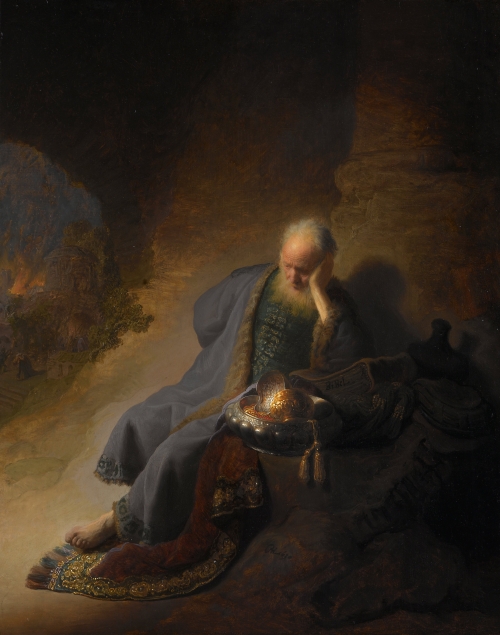
As for us, our eyes as yet failed for our vain help: in our watching we have watched for a nation that could not save us. They hunt our steps, that we cannot go in our streets: our end is near, our days are fulfilled; for our end is come. (Lamentations 4:17-18)
I have tried to maintain a habit of reading the Bible through every year. I like getting a different translation of The One Year Bible because it presents a systematic method of reading a portion from the Old Testament, portion from the New Testament, and a reading out of the “Wisdom Books”[1] every day. The year before last, I tried reading through the Chronological Study Bible (NKJV), because I thought it would be interesting to read Scripture in the sequence of the historical events.
The trouble, for me, in following a prescribed reading plan of any kind is the pressure that comes from knowing you have so much reading to get done today because if you don’t, you will get behind. And if you fall more than one day behind in your reading, it easy to become discouraged and stop. I got behind on my reading several times, but I never became discouraged enough to quit. I am not bragging; I am confessing. When I felt pressure like that, I felt I had to get my reading done, so in my rush to get through it, I missed a lot.
I do not like to read the Bible like that. I like to take my time and really soak it in. I read slowly anyway, but I like to read for detail, and I enjoy “interacting” with what I read. I have developed a system of color coding[2] passages of Scripture with color pencils so that when I leaf through my Bible, I can tell about what the passage refers by the color that highlights it.
Last year I started reading my new King James Bible without the words of Jesus in red. (Red interferes with color coding.) I have not made it all the way through yet, but I am enjoying the “study” much better. I started with the New Testament, then the Minor Prophets, then the books of Wisdom, and now I am in the Major Prophets. I finished Isaiah, Jeremiah, and Lamentations, and I just started on Ezekiel.
That brings me to the subject of my title. The study of Scripture is not a “cause for tears.” Quite the contrary, it brings me a lot of joy. However, as I mentioned, I just finished my study of Jeremiah and Lamentations. The Prophet Jeremiah authored both books. Jeremiah is known as the “Weeping Prophet,” and he had great cause for tears.
He lived at the time of Judah’s demise. He ministered during the time of Judah’s last three kings: Josiah, Jehoiakim, and Zedekiah.[3] He witnessed the first invasion by the Chaldeans under Nebuchadnezzar that took the first round of captives to Babylon. The Prophet Daniel was in this first group. Nebuchadnezzar took Jehoiakim captive and replaced him with his brother, Zedekiah. After nine years, Zedekiah rebelled against Nebuchadnezzar by refusing to pay tribute, so Nebuchadnezzar mounted a second invasion of Jerusalem. This time he razed Jerusalem to the ground. Nebuchadnezzar took Zedekiah captive, but not before making him watch the slaughter of his sons before having his eyes gouged out.[4] Jeremiah witnessed all of this.
Jeremiah had cause for tears. For 40 years he pleaded with Judah to repent of her idolatries. He warned of impending doom for their obstinance and refusal to abandon their pagan gods and return to “the God of Israel.” For this, he was persecuted, mistreated and imprisoned, yet he refused to stop proclaiming, “Thus saith the LORD.” To the first round of captives taken, he wrote letters encouraging them to build houses, plant gardens, take wives and raise families, seek the welfare of the city in which they lived, and not to listen to the false prophets that said the captivity would not be for long.[5] This oft-quoted out-of-context passage followed God’s admonition. “For I know the thoughts that I think toward you, saith the LORD, thoughts of peace, and not of evil, to give you an expected end” (Jeremiah 29:11). Although we can take comfort knowing that God only desires the best for His people, we must also keep in mind to whom this was addressed and the circumstances that precipitated it.
What follows clearly shows that this message was for them, not necessarily for us. “Then shall ye call upon me, and ye shall go and pray unto me, and I will hearken unto you. And ye shall seek me, and find me, when ye shall search for me with all your heart. And I will be found of you, saith the LORD: and I will turn away your captivity, and I will gather you from all the nations, and from all the places whither I have driven you, saith the LORD; and I will bring you again into the place whence I caused you to be carried away captive” (Jeremiah 29:12-14). They treated Jeremiah as a traitor for this message of hope.
God gave many promises to Jeremiah concerning Israel’s bright future. “And I will gather the remnant of my flock out of all countries whither I have driven them, and will bring them again to their folds; and they shall be fruitful and increase. And I will set up shepherds over them which shall feed them: and they shall fear no more, nor be dismayed, neither shall they be lacking, saith the LORD” (Jeremiah 23:3-4). “Therefore fear thou not, O my servant Jacob, saith the LORD; neither be dismayed, O Israel: for, lo, I will save thee from afar, and thy seed from the land of their captivity; and Jacob shall return, and shall be in rest, and be quiet, and none shall make him afraid. For I am with thee, saith the LORD, to save thee: though I make a full end of all nations whither I have scattered thee, yet will I not make a full end of thee: but I will correct thee in measure, and will not leave thee altogether unpunished” (Jeremiah 30:10-11). “Behold, I will gather them out of all countries, whither I have driven them in mine anger, and in my fury, and in great wrath; and I will bring them again unto this place, and I will cause them to dwell safely: And they shall be my people, and I will be their God: And I will give them one heart, and one way, that they may fear me for ever, for the good of them, and of their children after them: And I will make an everlasting covenant with them, that I will not turn away from them, to do them good; but I will put my fear in their hearts, that they shall not depart from me” (Jeremiah 32:37-40).
We see these promises being fulfilled before our eyes. Israel has returned to her land. From all over the world, Jews are returning to their Promised Land, and the desert is blooming.[6] Yet, in spite of the promise of a bright future, Jeremiah watched his beloved Jerusalem crumble to dust and all her people either killed by the sword or taken away captive. It was cause for tears.
As I read Jeremiah’s record, it is a cause for tears because I see what Jeremiah saw but in my beloved nation. Our nation is steeped in idolatry. It is not so much in the form of pagan deities, although there is some of that in the growing number of occult practices – Wicca, witchcraft, satanism, etc. – but mostly in the worship of all forms of entertainment and materialism. Anything that takes a higher priority than God is idolatry.
Our country has fallen prey to the practice of infanticide in the form of abortion even up to the time of birth. There may not be a blazing bronze statue of Baal on which to burn the babies, but abortion is an offering to Baal nonetheless.
Pornography is often a secret sin harbored by many Christians, even Christian leaders. Prostitution has become passé so much that even President Trump’s indiscretion with a porn star is only a slight embarrassment because of its exposure.
The “gay” agenda continues to force its presence into the mainstream so that public schools are indoctrinating children as young as kindergarten into the “normalcy” of this perverse behavior. Children are being taught that they can reject the biological sex with which they were born and be whatever sex they choose to be. Recently, the media celebrated an eleven-year-old “drag princess” for his “talent” in dancing for dollars at a gay bar.[7] Another ten-year-old “drag princess” was photographed posing with a naked adult drag queen,[8] and our society seems to think nothing of it. How is this not considered a form of child abuse?
Then there are child prostitution rings where grown men go to engage in sexual intercourse with little girls and boys. There is an island in the Caribbean where many of our politicians go to engage in sex with children.[9] Imagine the power the ring operators hold over politicians for keeping their secrets.
All of this and more is cause for tears. It took Israel less than 1000 years to arrive at such a depraved condition where God had to banish them from the land. Our nation, from the arrival of the Pilgrims in 1620, is only 399 years old, and look at how far we have fallen! Arguably, this moral decline has taken place within the last generation – 70 years – and has rapidly accelerated within the last 20 years.
Another popular verse of Scripture quoted out of context is 2 Chronicles 7:14. God made this promise to Solomon at the dedication of the Temple. He said, “If my people, which are called by my name, shall humble themselves, and pray, and seek my face, and turn from their wicked ways; then will I hear from heaven, and will forgive their sin, and will heal their land.” His people did not humble themselves, pray, seek His face, nor turn from their wickedness, and the Temple to which they were to turn was completely destroyed. Surely there was a remanent of faithful ones among the wicked. Daniel, Hananiah, Mishael, and Azariah were among those,[10] but that did not stop God from punishing the nation.
We do not have a Temple toward which to pray except for the one “not made with hands, eternal in the heavens” (2 Corinthians 5:1). Still, God throughout the ages instructed us to pray for our nation and our leaders;[11] but that offers little security if God deems the nation unredeemable. Perhaps part of God’s punishment will include taking out the faithful before the final destruction. However, like Jeremiah knowing the future promise of restoration yet living in the midst of national decline, we have cause for tears. Come quickly, Lord Jesus!
Notes:
[1] The “books of Wisdom” or the “Wisdom Books” include Job, Psalms, Proverbs, Ecclesiastes, and Song of Solomon.
[2] My system of color coding: Yellow = Noteworthy; Orange = Attributes of God; Green = Attributes of Jesus; Light Blue = Attributes of Holy Spirit; Purple = Word of God; Red = Blood/Salvation; and Brown = End-Times Prophecy
[7] “Nolte: 11-Year-Old ‘Drag Queen’ Dances for Dollar Bills in Gay Bar”
[8] “10yo Drag Queen Posing with Naked Adult Man is “Beautiful” and “Not Sexualized”



